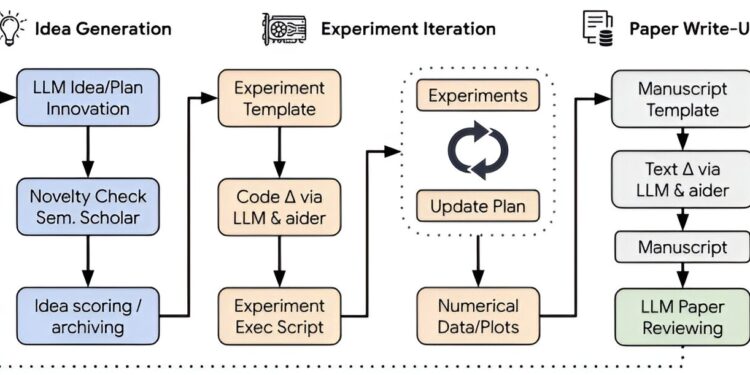Conceptual illustration of The AI Scientist, an end-to-end scientific discovery process based on an LLM. Credit: arXiv (2024). DOI: 10.48550/arxiv.2408.06292
A team of AI researchers from Sakana AI in Japan, working with colleagues from the University of Oxford and the University of British Columbia, has developed an AI system capable of conducting scientific research autonomously.
The group published an article on the arXiv preprint server describing their system, which they call “The AI Scientist.” They also published a preview of their system on the company’s Sakana website.
Scientific research is usually a long and complex process. It usually starts with a simple idea, such as “Is there a way to stop plaque from building up on human teeth?” Scientists then look at other studies to see what research has been done on the topic.
Then they draw up an action plan, followed by a needs assessment and cost analysis. If all goes well, a project is launched and personnel and equipment requirements are determined. This is followed by the actual research and the writing of a research report detailing the process used and the results. After this, if justified, the report is published and the reported findings are exploited.
This general process can be time-consuming, difficult, and often expensive, primarily due to labor costs. In this new effort, the research team eliminated labor costs by automating the entire process, from idea generation to delivery of the written document.
The AI system uses LLMs to mimic the scientific research process and has already been tested by asking it to perform tasks related to AI research, meaning it is already conducting research to find ways to improve its own capabilities. The researchers say their system is currently conducting real scientific work and that, as part of this effort, it is producing acceptance-level papers.
If these claims are true, this development will likely have a major impact on the scientific community. If AI systems start to conduct the type of research that humans do today, millions of jobs could be lost, universities could see their enrollment numbers plummet, and research funding could be significantly reduced.
On the other hand, such research could lead to major advances in fields such as cancer research, drug development, climate change mitigation strategies, or perhaps a genuine understanding of mysteries such as gravity, dark matter, or why life exists on Earth and seemingly nowhere else.
More information:
Chris Lu et al., The AI Scientist: Towards Fully Automated Open Scientific Discovery, arXiv (2024). DOI: 10.48550/arxiv.2408.06292
Github: github.com/SakanaAI/AI-Scientist
Sakana.ai: sakana.ai/ai-scientist/
arXiv
© 2024 Science X Network
Quote:”AI Scientist” model designed to conduct scientific research autonomously (2024, August 15) retrieved August 15, 2024 from
This document is subject to copyright. Apart from any fair dealing for the purpose of private study or research, no part may be reproduced without written permission. The content is provided for informational purposes only.



